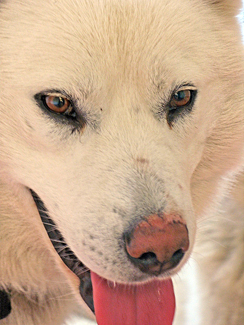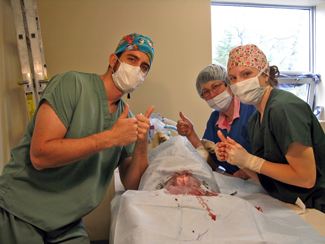From the Editor
Tumivut: Three Stories
Chinook Project’s Labrador 2012 Report
In the News
Media Review (book): Remembering the Years of My Life
Media Review (film): Labrador North
Akunnirmiut Nunavut Quest
Nunavut Quest Documentary Ready for Sale!
Good Reads
IMHO: Last Call
Index: Volume 14, The Fan Hitch
Navigating This Site
Index of articles by subject
Index of back issues by volume number
Search The Fan Hitch
Articles to download and print
Ordering Ken MacRury's Thesis
Our comprehensive list of resources
Defining the Inuit Dog
Talk to The Fan Hitch
The Fan Hitch home page
ISDI home page
Editor's/Publisher's Statement
Editor: Sue Hamilton
Webmaster: Mark Hamilton
The Fan Hitch, Journal of
the Inuit Sled Dog, is published four times
a year. It is available at no cost online
at: https://thefanhitch.org.
The Fan Hitch welcomes your letters, stories, comments and suggestions. The editorial staff reserves the right to edit submissions used for publication.
Contents of The Fan Hitch are protected by international copyright laws. No photo, drawing or text may be reproduced in any form without written consent. Webmasters please note: written consent is necessary before linking this site to yours! Please forward requests to Sue Hamilton, 55 Town Line Rd., Harwinton, Connecticut 06791, USA or mail@thefanhitch.org.
This site is dedicated to the Inuit Dog as well as related Inuit culture and traditions. It is also home to The Fan Hitch, Journal of the Inuit Sled Dog.
The Fan Hitch welcomes your letters, stories, comments and suggestions. The editorial staff reserves the right to edit submissions used for publication.
Contents of The Fan Hitch are protected by international copyright laws. No photo, drawing or text may be reproduced in any form without written consent. Webmasters please note: written consent is necessary before linking this site to yours! Please forward requests to Sue Hamilton, 55 Town Line Rd., Harwinton, Connecticut 06791, USA or mail@thefanhitch.org.
This site is dedicated to the Inuit Dog as well as related Inuit culture and traditions. It is also home to The Fan Hitch, Journal of the Inuit Sled Dog.

One of the dogs in Hopedale.
Photo: The Chinook Project
The Chinook Project’s 2012 Clinics
by Dr. Marti Hopson
Atlantic Veterinary College
University of Prince Edward island
In June of 2012, the Chinook Project visited two communities: Hopedale (pop. 500) and Nain (pop. 1200). Both are coastal towns in Northern Labrador, Canada, accessible only by plane. There were two separate teams, comprised of four veterinary students and three veterinarians or coordinators. We were lucky to involve faculty members from the Atlantic Veterinary College as well as veterinarians from Kensington (PEI), Clarenville (Newfoundland), Goose Bay (Labrador) and Wakefield (Quebec). This made a total of 14 people who set up mobile clinics in a fire hall and vacant health centre to serve the needs of the dogs (and cats) in these communities.
The Chinook Project offers many thanks to the volunteers on the ground who organized accommodations, food and the appointment schedule. This was the first time Hopedale had seen veterinary care, and in Nain no veterinarians had been able to visit in a number of years! Most dogs are owned in these towns, and the community members were very grateful to have access to this free veterinary service. The teams were treated to some local food and they were also able to go fishing and on other boat trips to enjoy viewing the local landscape and wildlife.
The most difficult logistic for these 2012 wellness clinics was shipping all supplies to the North so that they would be on location when the teams arrived, as well as transferring equipment from one site to the next in a short time frame! Air Labrador was helpful with discounts for plane tickets and the RCMP was able to take some of our cargo from Goose Bay to the sites. As always, about 90% of our budget is spent on transportation and shipping. Thanks are in order to Pfizer Animal Health, the Atlantic Veterinary College, the Rathlyn Foundation, Boehringer Ingelheim, Ann McCain Evans, Iams Eukanuba Canada and other generous donors.

Veterinary student Shari
(wearing surgical gloves) has just completed
a spay. Student Waylon (L) and Dr. Gallant, who monitored the
anesthesia during the procedure, look on. Photo: The Chinook Project
The Chinook Project was able to spay
and neuter over 100 dogs and cats during these
trips, and over 200 animals were seen in total for
vaccinations, physical exams or surgery. Interest is
strong in having the Chinook Project return to
northern Labrador next year. There has been a steep
increase in rabies cases seen in the local fox
population, as well as the dangers of zoonotic
parasites such as Echinococcus (a tape worm
infection that can be fatal when passed to humans
from dogs or wildlife). The importance of
vaccinating and deworming the canine population, as
well as increased public health awareness and
education continues to be of paramount importance.a spay. Student Waylon (L) and Dr. Gallant, who monitored the
anesthesia during the procedure, look on. Photo: The Chinook Project
Donations to help the Chinook Project can be made to:
The Sir James Dunn Animal Welfare Centre, att: Dr. Alice Crook, Atlantic Veterinary College, University of Prince Edward Island, 550 University Ave, Charlottetown, PEI C1A 4P3 Canada.